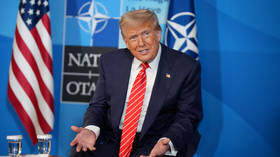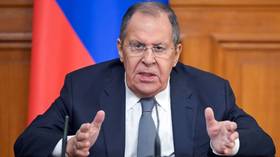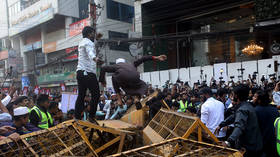Rand Paul: 10 things to know about soon-to-be presidential nominee
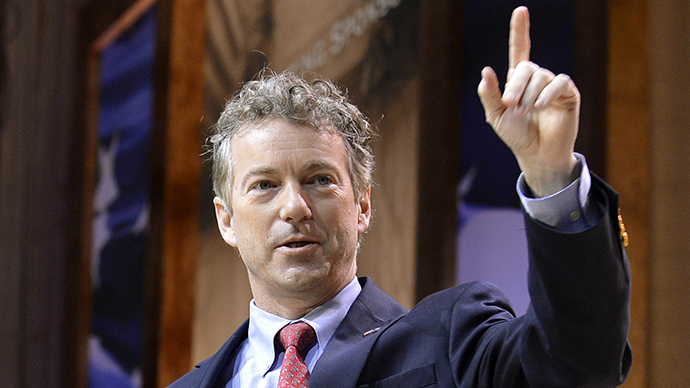
US Senator Rand Paul is set to announce on Tuesday the official beginning of his campaign for the 2016 Republican presidential nomination. Though he has a record of thwarting his party’s establishment, a Rand Paul candidacy will likely not be as bold.
Paul has indicated of late that he will work to court
more conventionally-conservative voters -- and big money donors -- while attempting to maintain his
perceived outsider, libertarian credentials.
Here are ten things to know about the Kentucky senator a day
before he announces his candidacy with the slogan: “Defeat the Washington machine.
Unleash the American dream.” Beyond Tuesday, expect a spectrum of
political pandering.
1. Foreign policy
After years of falling on the anti-interventionist side of the
debate over America's place in the world, Paul straddled the line
during the annual Conservative Political Action Conference in
February. Paul said, according to the Washington Post, that
his presidency would focus on “a national defense
unparalleled, undefeated and unencumbered by
nation-building."
Last June, he said US policy had created extremist-laden
"jihadist wonderlands" in the likes of
Iraq and Libya through America's persistent meddling in the
affairs of foreign nations. And while he has called likely Democratic presidential candidate
Hillary Clinton a "war hawk" bent on involving the US in
further conflicts in the Middle East, he has also pined for more
American military action in order to "destroy" the Islamic State, an extremist group
especially strong in Syria and Iraq.
While voting for war against Islamic State, Paul also opposed
arming rebel groups in Syria, criticizing the
effort for potentially boosting the same fighters that are
battling alongside Islamic State militants in the Syrian civil
war against President Bashar Assad.
Paul has also called for a boycott of Saudi Arabia, America's influential ally
in the Middle East and leading partner in the coalition fighting Islamic
State militants.
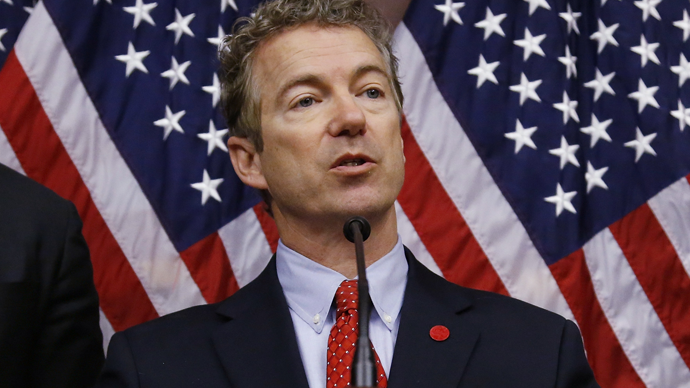
2. Iran
On Iran and its nuclear program, Paul has not been as hawkish as
some of his peers in the GOP. In 2012, he voted against a non-binding resolution to prevent
Iran from acquiring nuclear weapons, calling the proposal a
de-facto declaration of war. He has also opposed harsher sanctions against Iran, again saying
he was against to any effort that could be considered an act of
war.
“Before sending our young men and women into combat we should
have a mature and thoughtful debate over the ramifications of
war, over the advisability of war and over the objectives of the
war,” Paul said.
Paul has chastised his party for obstructing nuclear
negotiations between Iran and Obama administration officials.
Yet, last month, Paul signed a Republican letter sent to Iran leadership
announcing that any deal the Obama administration negotiated with
Tehran over its nuclear program would likely dissolve if a
Republican replaced Obama in January 2017, when Obama will leave
office. The move was decried as political meddling in diplomatic
affairs by a US Congress. Paul said he only signed it to
strengthen the president's hand.
"I want the president to negotiate from a position of
strength, which means that he needs to be telling them in Iran,
'I've got Congress to deal with,'" Paul said, adding, that he also endorsed the
letter based on his support for the separation of powers invested
in the US Constitution.
"I wouldn't have signed the letter had he [Obama] not altered
immigration law on his own, had he not altered the health care
law on his own, and had he not taken us to war on his own,"
Paul said.
3. Military spending
Paul has called for further cuts to US military spending, an
opinion seldom voiced among his party.
"I believe national defense is the most important thing we
do, but it isn't a blank check," he said last year. "Some conservatives
think, 'Oh, give them whatever they want and that everything is
for our soldiers' and they play up this patriotism that, 'Oh, we
don't have to control defense spending.'"
"We can't be a trillion dollars in the hole every year,"
he added.
But, as foreshadowed by his comments in February over an
"unparalleled" and "undefeated" national
defense, he seems to understand that calling for cuts to the
military budget won't get him far with many non-libertarian
Republicans. To that end, after his campaign announcement on
Tuesday, he will appear at at Patriots Point in South Carolina’s
Charleston Harbor, using a World War II aircraft carrier as a
background prop, according to the Washington Post.
4. Drone strikes
Paul has argued against extrajudicial drone assassinations of
American citizens, such as was the case with Muslim cleric
Anwar al-Awlaki. In 2013, Paul filibustered the nomination of John Brennan as head
of the Central Intelligence Agency over the Obama
administration's justification of drone strikes against
Americans.
"I will speak as long as it takes, until the alarm is sounded
from coast to coast that our Constitution is important, that your
rights to trial by jury are precious, that no American should be
killed by a drone on American soil without first being charged
with a crime, without first being found to be guilty by a
court," he said during the filibuster.
Paul has also expressed concern for the threat to privacy posed by
everyday use of unmanned aerial vehicles in American skies. The
federal government is currently crafting rules regarding domestic drone use.
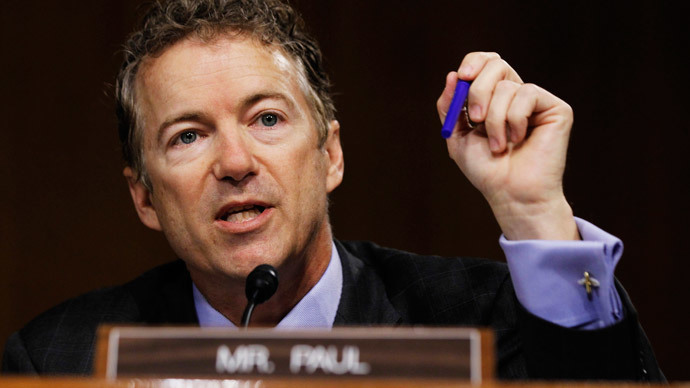
5. NSA reform
Some consider that Paul began his slide away from his roguish
denunciations of Washington’s power abuses long before the
present day. He has excoriated revelations of the National
Security Agency's global spying regime, exposed by former
intelligence contractor Edward Snowden in 2013, going as far as
to sue the Obama administration over the
constitutionality of the NSA program that collects metadata on US
citizens' phone calls.
“There's a huge and growing swell of protest in this country
of people who are outraged that their records are being taken
without suspicion, without a judge's warrant, and without
individualization,” Paul said. “I'm not against the NSA,
I'm not against spying, I'm not against looking at phone records.
I just want you to go to a judge, have an individual's name and
[get] a warrant. That's what the Fourth Amendment says.”
Yet when the admittedly tepid NSA reform bill was a mere two
votes from passing the US Senate in November, Paul balked, saying
the legislation was not strong enough. Paul later claimed he
“felt bad” that the legislation failed, because it
“probably needed my vote."
The 'no' vote by Paul, a civil libertarian in the mold of his
father and former presidential candidate Ron Paul, was seen by
some as a fig leaf to Mitch McConnell, the powerful,
well-connected top Republican in the Senate.
The vote has also received criticism from Sen. Ted Cruz, the only
official Republican presidential candidate thus far, who voted
for the legislation and is expected to challenge some of Paul's
support among unorthodox modern American conservatives.
And despite his overall opposition to the NSA's vast surveillance
powers, Paul said he opposes clemency for Snowden, who was
responsible for revealing abuses Congress should have flagged in
the first place. Paul did say, though, that Snowden -- currently
in exile in Russia -- should only get a few years in prison for the unauthorized
disclosures.
6. Criminal justice reform
In response to national outrage over the utilization of military
weaponry by police in Ferguson, Missouri -- which is emblematic
of police forces across the nation -- Paul has been among the few in
Congress to consider stemming the flow of Pentagon excess to
towns across America. At congressional hearing in September, Paul said heavy-handed use of
force by police in Ferguson was “thoroughly
un-American,” and that the Pentagon’s 1033 program should be
shuttered.
In mid-March, Paul appeared at at Maryland’s Bowie State University, a
historically black college, to champion criminal justice reform.
He told the crowd of 200 students and community leaders that
reforms to the justice system are necessary because current
sentencing laws are harsh and disproportionally affect
African-Americans. In the wake of the damning US Department of Justice report on the
Ferguson Police Department and court system, Paul spoke out
against practices such as excessive fines that have become an
economic boon to local governments, as well as the seizure of
private assets by police prior to criminal conviction.
“It’s predominately [affecting] African-American, it’s
predominantly [affecting] Hispanics. But if you want one common
denominator, it’s predominantly [affecting] people who live in
poverty,” he said at Bowie State. “It’s unfair and it
ought to stop. This is one thing the president and I agree
on.”
While some lauded the sentiments expressed by Paul, others were
not as impressed.
“I found him superficial,” Bob Woodson, president of the
Center for Neighborhood Enterprise, told the Washington Post. “I think these
guys have got to do more than show up. Going to Howard
[University] and then going to Ferguson [Missouri]? I don’t know
what that was all about. His talk about the militarization of
police felt like pandering.”
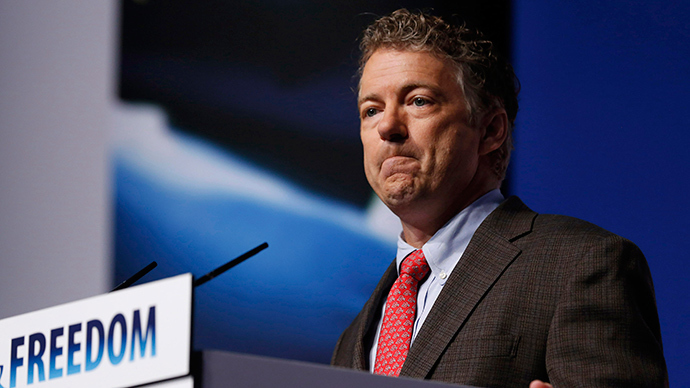
7. Religious freedom and gay rights
Paul has not commented on Indiana's controversial 'religious freedom' bill, which many see as an attempt to discriminate against others based on one's religion. Paul did say in March that, “The First Amendment says keep government out of religion. It doesn’t say keep religion out of government," the Washington Post reported. As the Huffington Post reported last week, Paul has not supported marriage equality rights for gays and lesbians.
8. Marijuana legalization
Paul has supported legalizing small amounts of
recreational marijuana, and he has sponsored legislation to
legalize medical marijuana across the nation.
"The main thing I’ve said is not to legalize them, but not to
incarcerate people for extended periods of times,” he has
said of nonviolent drug offenders going to prison for decades
during America's so-called 'war on drugs.'
9. Audit the Fed and IRS reform
One of Paul's longtime positions has been to audit the Federal Reserve.
"The Fed's operations under a cloak of secrecy have gone on
too long and the American people have a right to know what the
Federal Reserve is doing with our nation's money supply,"
Paul said when he proposed an audit bill in 2013. "Audit the Fed
has significant bipartisan support in Congress and across the
country and the time to act on this is now."
Reform of the Internal Revenue Service is another Paul priority.
One method of doing so, he has said, involves instituting a flat
tax that is the same for all taxpayers, rather than a progressive
or tiered tax system.
“What you’d have is an attrition if not an outright elimination
of the IRS because it would be so simple that people would
comply, and it would be very simple to know whether they complied
or not,” Paul said in 2013.
10. Plagiarism accusations
In late 2013, the Washington Times newspaper announced that it is ending a regular column by
Kentucky Senator Rand Paul following a series of plagiarism
charges against his work. Paul was accused of not only failing to
properly cite references for his written and spoken work, but
also of essentially lifting passages verbatim from other sources.
He took responsibility for the tainted work, saying he has staff
and advisers who help him with his speeches and columns.
"Ultimately, I'm the boss, and things go out under my name,
so it is my fault," he said. "I never had intentionally
presented anyone's ideas as my own."




